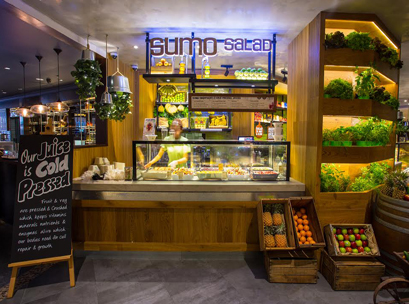Sumo Salad has pushed back the opening of its first North American store. The health food chain has delayed the opening until mid-January 2015, due to a hold up with construction. The North American venture was announced in October, with the first store earmarked for a November opening in Los Angeles. Luke Baylis, CEO of Sumo Salad, told Inside Retail PREMIUM construction issues could not be overcome before Christmas, so there was no choice but to delay the opening. Sumo Salad wil
ll pilot five stores in the LA market, with the option of expanding into Nevada with US master franchise partner, Mat Yudistsky.
“Upon getting proof of concept and the model working correctly we’ll look to do a fairly large capital raise and expand quite aggressively,” said Baylis.
“We’ve got a 36 month window to get the five pilot stores up and get the proof of concept before we go out into the stage two.”
Sumo Salad has 103 stores in Australia, and 14 globally across New Zealand, Singapore, Dubai, and Brazil.
In May, Sumo Salad launched its ‘store of the future’ concept, which saw the introduction of hydroponic vertical garden walls instore.
The installation includes fresh seasonal vegetables and herbs grown and maintained instore, and where possible served in meals. The LA store will follow this concept, while the menu will be adapted to contain more organic produce, which Baylis says is more accessible in the US.
Locally, Sumo Salad plans to have 250 stores trading under the new concept within five years.
Thirty of these stores are to open in 2015, predominantly along the east coast of Australia.
“We’re doing a lot of expansion in sub-regional areas and we’ll also be doing a lot of stuff outside of shopping centres in more hospitals and non-traditional retail environments.”
The first hospital location opened in Western Australia last month.
The business has also launched a pop up concept in partnership with Dexus, which is a fully functioning store that can be installed within 24 hours.
“It’s very self sufficient and it’s good because we can put it in areas for a short term, whether it be for events, or if a centre is going through a construction, we can put something in as an interim and maintain a presence in those locations where we couldn’t do that with a full store.
“We will be doing events but the main focus is more for building lobbies and hospitals and things like that, where we can set things up quite quickly and easily.”
This story first appeared in Inside Retail PREMIUM issue 2028. To subscribe, click here.

